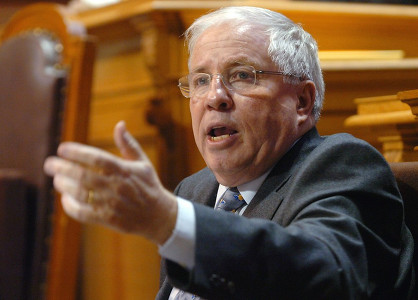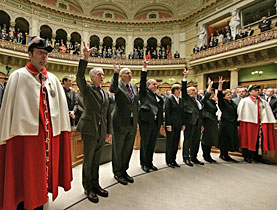Has the pendulum swung against Blocher?

Justice Minister Christoph Blocher risks leaving the Swiss cabinet the way he entered it four years ago – with a bang.
His election on December 10, 2003 was perhaps as dramatic as parliament’s decision on Wednesday to oust him.
The Zurich politician – a member of the rightwing Swiss People’s Party – came into the cabinet when the centre-right Radicals in parliament backed his candidature.
Blocher’s victory came at the expense of his predecessor at the justice ministry, Ruth Metzler, a member of the Christian Democrats, who had lost seats in the 2003 general election unsettling the balance of power.
A pugnacious, charismatic personality provoking admiration or dislike, the 67-year-old Blocher never hid his lack of regard for the “political class”.
Those who thought he could be neutralised by giving him the post of justice minister were soon disillusioned.
Skilled speaker
The skilled speaker, who knows how to polarise, set the tone shortly after entering the cabinet by strengthening new laws on asylum and foreigners, major issues for the People’s Party.
It was a process that shocked quite a few people because Blocher’s decision came at a time when the House of Representatives and Senate were examining changes already worked out by Metzler.
Another project that he tackled with determination was the merger of the federal offices responsible for refugees and immigration.
Listing his infringements of the Swiss principle of collegiality became a kind of national sport for Blocher’s opponents.
During his first national vote on life imprisonment for very dangerous criminals, he called for respect of the popular will and did not care if the outcome ran contrary to international law and the federal constitution.
Little respect
He had little respect for the separation of powers, openly criticising Switzerland’s highest instance, the Federal Court, and the asylum appeal commission.
Blocher was implicated in the highly publicised affair surrounding the resignation of the Swiss public prosecutor, Valentin Roschacher, in 2006.
Collegiality was strained on several occasions when he gave only minimum support to issues that cabinet supported but he opposed – for example the Schengen/Dublin accords on security and asylum, and the easing of naturalisation restrictions.
For his critics, there was occasionally confusion about whether he was serving the interests of the government or his party.
However, although pursuing rightwing policies, he is not considered as extreme as, for example, France’s nationalist politician Jean-Marie Le Pen or Austria’s Jörg Haider.
He notably earned a rebuke from the cabinet after remarks he made in Turkey on wanting to change Swiss anti-racism legislation.
Blocher – in the name of transparency – also called for cabinet votes to be made public.
Reformer
A champion of “less state intervention”, he styled himself as a reformer of the federal administration, which he accused of being a “protected workshop”.
He had hardly stepped foot inside the justice ministry before he was changing its structure, seeking to apply methods from the business world he had used as CEO of the Ems-Chemie company.
Blocher always claimed he was making a personal sacrifice by entering government. But observers say in reality he had ambitions for a more strategic portfolio, such as minister of the interior, finance or transport.
swissinfo, adapted from a report by Florence Pictet, Swiss news agency
Christoph Blocher was born in October 1940 in Schaffhausen in northern Switzerland.
As an industrialist he made his fortune in the chemical industry with the EMS-Chemie company.
In his political career, he has campaigned vigorously against Swiss membership of the European Union and for tighter immigration controls.
He represented the canton of Zurich in the Swiss House of Representatives from 1980 till his election to the cabinet in 2003.
Until then he was also president of the Action for an Independent and Neutral Switzerland, which in particular was against Swiss membership of the United Nations.

In compliance with the JTI standards
More: SWI swissinfo.ch certified by the Journalism Trust Initiative









You can find an overview of ongoing debates with our journalists here . Please join us!
If you want to start a conversation about a topic raised in this article or want to report factual errors, email us at english@swissinfo.ch.